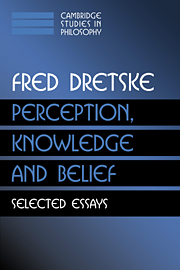9 - The Mind's Awareness of Itself
Published online by Cambridge University Press: 19 December 2009
Summary
The hard problem of consciousness, the place where the explanatory gap is widest – viz., the nature of phenomenal experience – is especially vexing for people who believe that:
Conscious perceptual experiences exist inside a person (probably somewhere in the brain)
Nothing existing inside a person has (or needs to have) the properties one is aware of in having these experiences.
The experience I have when I see (dream of, hallucinate) a large orange pumpkin has to be inside me. Why else would it cease to exist when I close my eyes, awaken, or sober up? Yet, nothing inside me – certainly nothing in my brain – has the properties I am aware of when I have this experience. There is nothing orange and pumpkin-shaped in my head. How, then, can I be aware of what my perceptual experiences are like – presumably a matter of knowing what qualities they have – if none of the properties I am aware of when I have these experiences are properties of the experience?
Surely, though, we are, in some sense, aware of our own conscious experiences. We have, if not infallible, then privileged, access to their phenomenal character. I may not know what it is like to be a bat, but I certainly know what it is like to be me, and what it is like to be me is primarily – some would say it is exclusively – a matter of the phenomenal qualities of my perceptual (including proprioceptive) experience.
- Type
- Chapter
- Information
- Perception, Knowledge and BeliefSelected Essays, pp. 158 - 177Publisher: Cambridge University PressPrint publication year: 2000
- 2
- Cited by



